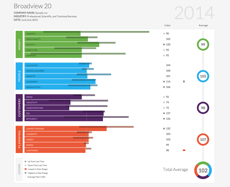
New York Times columnist Tom Friedman was on Charlie Rose last night talking about "Thank You For Being Late: An Optimist's Guide to Thriving in The Age of Accelerations," his take on the three primary forces shaping the workplace, politics, geoplitics, ethics and our sense of community in the 21st Century:
- The digital globalization of markets via Facebook, PayPal, Alibaba, Twitter, Amazon and cloud computing
- The way climate change is impacting population growth and biodiversity in the developing world and changing immigration patterns
- The continued acceleration of technology, exemplified by Moore's Law, which states that the speed and power of microchips will double roughly every 24 months
From a work perspective, a key insight is the transformation of "AI to IA," or "Artificial Intelligence to Intelligent Assistance, Intelligent Assistance, and Intelligent algorithm," in which he suggests that success in the future will come to those who "leverage the best of what machines can do and meld it with the best of what humans can still uniquely do – that is, relate to another human being and enable them to navigate the world more effectively.”
We are certainly starting to see that in the way CPAs and consultants use our cloud-based Comparative Analysis & Benchmarking Tool to engage more deeply with their clients, but if Friedman is right, that trend will not only accelerate, but become the norm for everyone.
So how do we survive?
He suggests the key is simple: never stop learning, evolving and challening yourself to do more.
You can find the entire episode here after 11/24.
Alternately, there's a good interview with him in Forbes:
Schawbel: How will all of this impact workers?
Friedman: The short answer is that average is over. More and more machines can do more and more above average physical and cognitive work these days. IBM’s Watson cognitive computer just co-wrote a song that’s on sale on iTunes. Basically, every middle class job is being pulled in three directions at once. It is being pulled up – it will require more skill or human touch – it is being pulled out – more machines, robots or workers in India or China can compete for it – and it is being pulled down – made obsolete faster than ever.
The companies and workers that are managing this best are those who are embracing life-long learning. The idea that you go to college for four years and store up all the knowledge you need to last you for the next thirty is a thing of the past. When I graduated from college I got to “find’’ a job. I tell my daughters they will have to “invent’’ a job. Oh, they may get lucky and get their first job, but to stay in that job, advance in that job and grow their income in that job they will have to regularly re-invent that job in line with the pace of change. I repeat: Watson just wrote a song…
Schawbel: Who will be the winners and losers?
Friedman: I think the best, most high-paying jobs, in the future will be what I call “STEMpathy’’ jobs. These are jobs that combine STEM (Science, Technology, Engineering and Math) skills with old-fashioned human empathy. STEMpathy jobs leverage the best of what machines can do and meld it with the best of what humans can still uniquely do – that is, relate to another human being and enable them to navigate the world more effectively. That’s where the best jobs in the future will be. If IBM’s Watson has read every article published on cancer then I want a doctor or a nurse who can ask Watson the right questions and be able to take those answers and relate them to me as a real human being.
Schawbel: Which companies will thrive?
Friedman: The companies I see doing best in this fast world all have a few things in common. One, they wake up every day and ask themselves: “What world are we living in today? What are the biggest trends in this world — and how do I get the most out of them and cushion the worst?’’ They are relentlessly curious and paranoid. Two, they have inspirational leaders. Young people in particular are attracted to mission-driven people and CEOs. Three, they demand — and they create — the resources for life-long learning. They understand, as management experts John Hagel and John Seely Brown have pointed out, that we live in a world of ”flows not stocks.’’ You and your employs have to constantly be in the flow of ideas, refreshing it and being refreshed by it.Schawbel: What is your best career advice?
Friedman: Always think like an immigrant and stay hungry. Always think like an artisan and bring a special pride to your work. “Always be in Beta,” as Reid Hoffman puts it. That is, always remember that the only four-letter word in Silicon Valley is “finished’’ – if you ever think you are a finished product you really will be finished. Always see your self as about 85% done, but constantly in need of improvement, retooling and re-engineering. Remember that PQ + CQ > IQ. Give me a young person with a high passion quotient and a high curiosity quotient and I will take them over a kid with a high intelligent quotient seven days a week. Finally, always, always think entrepreneurially. No matter what your job or role is in a company, be relentlessly entrepreneurial and always look for ways to fork off and start a new line of business.
From Forbes.
_____________________________
Get better insights from the data you already collect.
Companies generate more data than ever before but most of them don't get enough out of it. Our safe, secure Comparative Analysis & Benchmarking Tools take the data you already collect and turn it into competitive insights you can use to improve your performance.
→ Request a no-pressure demo:

_____________________________

